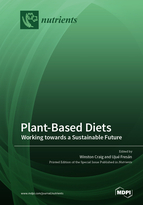Plant-Based Diets: Working towards a Sustainable Future
A special issue of Nutrients (ISSN 2072-6643). This special issue belongs to the section "Nutrition and Public Health".
Deadline for manuscript submissions: closed (5 April 2022) | Viewed by 104635
Special Issue Editors
Interests: plant-based diets and chronic diseases; health-promoting properties of phytochemicals; healthy sustainable diets; non-dairy alternatives
Special Issues, Collections and Topics in MDPI journals
Special Issue Information
Dear Colleagues,
Consumer interest in plant-based diets has been rapidly increasing in the past decade. Non-dairy and non-meat alternatives have gone mainstream. New products are appearing on the market continually. Questions have arisen as to how nutritionally sound and healthy are these products. The marketplace wants products that improve human and planetary health, ultimately worldwide. How sustainable are these plant-based diets. How significantly do they alter traditional dietary patterns? What impact do they have on food security? Do these plant-based meat and dairy alternatives help lessen environmental degradation? Will plant-based diets help in the goal to greatly diminish malnutrition and over-nutrition (leading to obesity) around the world? We invite research papers that describe these issues and provide some answers to the important questions.
Prof. Dr. Winston Craig
Dr. Ujué Fresán
Guest Editors
Manuscript Submission Information
Manuscripts should be submitted online at www.mdpi.com by registering and logging in to this website. Once you are registered, click here to go to the submission form. Manuscripts can be submitted until the deadline. All submissions that pass pre-check are peer-reviewed. Accepted papers will be published continuously in the journal (as soon as accepted) and will be listed together on the special issue website. Research articles, review articles as well as short communications are invited. For planned papers, a title and short abstract (about 100 words) can be sent to the Editorial Office for announcement on this website.
Submitted manuscripts should not have been published previously, nor be under consideration for publication elsewhere (except conference proceedings papers). All manuscripts are thoroughly refereed through a single-blind peer-review process. A guide for authors and other relevant information for submission of manuscripts is available on the Instructions for Authors page. Nutrients is an international peer-reviewed open access semimonthly journal published by MDPI.
Please visit the Instructions for Authors page before submitting a manuscript. The Article Processing Charge (APC) for publication in this open access journal is 2900 CHF (Swiss Francs). Submitted papers should be well formatted and use good English. Authors may use MDPI's English editing service prior to publication or during author revisions.
Keywords
- Plant-based diets
- sustainable diets
- food security
- cardiovascular health
- coronary heart disease
- diabetes
- chronic kidney disease
- obesity
- cancer
- Vegetarian







